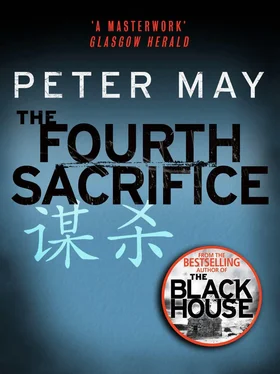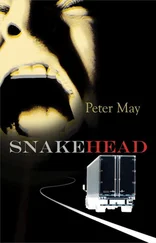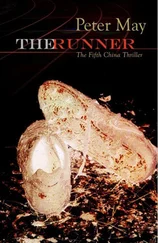Peter May - The Fourth Sacrifice
Здесь есть возможность читать онлайн «Peter May - The Fourth Sacrifice» весь текст электронной книги совершенно бесплатно (целиком полную версию без сокращений). В некоторых случаях можно слушать аудио, скачать через торрент в формате fb2 и присутствует краткое содержание. Год выпуска: 2012, Издательство: Quercus, Жанр: Триллер, на английском языке. Описание произведения, (предисловие) а так же отзывы посетителей доступны на портале библиотеки ЛибКат.
- Название:The Fourth Sacrifice
- Автор:
- Издательство:Quercus
- Жанр:
- Год:2012
- ISBN:нет данных
- Рейтинг книги:4 / 5. Голосов: 1
-
Избранное:Добавить в избранное
- Отзывы:
-
Ваша оценка:
- 80
- 1
- 2
- 3
- 4
- 5
The Fourth Sacrifice: краткое содержание, описание и аннотация
Предлагаем к чтению аннотацию, описание, краткое содержание или предисловие (зависит от того, что написал сам автор книги «The Fourth Sacrifice»). Если вы не нашли необходимую информацию о книге — напишите в комментариях, мы постараемся отыскать её.
The Fourth Sacrifice — читать онлайн бесплатно полную книгу (весь текст) целиком
Ниже представлен текст книги, разбитый по страницам. Система сохранения места последней прочитанной страницы, позволяет с удобством читать онлайн бесплатно книгу «The Fourth Sacrifice», без необходимости каждый раз заново искать на чём Вы остановились. Поставьте закладку, и сможете в любой момент перейти на страницу, на которой закончили чтение.
Интервал:
Закладка:
He stood up and arranged her pillows at the window end of her berth, and gently swung her legs up so that she reclined along its length. She felt him removing her shoes, slowly, carefully, his fingers brushing the unstockinged skin of her ankles, the arch of her foot. And she felt a rush of desire. But it was too late now. The moment had passed, and she felt incredibly sleepy and warm as he drew the quilt over her, tucking it in around her neck. Then his lips brushing gently over hers.
She drifted for a time, somewhere between sleep and wakefulness, aware of him clearing away the debris of their dinner before undressing, and then climbing into his berth and turning off the light.
A final thought, as she drifted into darkness, was a tiny stabbing moment of fear that she might start snoring.
*
Sunlight slanted over the peaks of mountains to the east, falling in long yellow slabs through the window of their carriage as Margaret opened sleepy eyes and found Michael sitting opposite, watching her.
‘Good morning,’ he said. ‘We’ll be there in under an hour.’
‘Oh, my God,’ she sat up suddenly, remembering her final thought before drifting off to sleep the night before. ‘I wasn’t snoring, was I?’
He shook his head and smiled. ‘Not too loudly.’
‘I wasn’t!’ she said.
His smile widened. ‘That’s for me to know. But don’t worry. Your secret’s safe with me. You know I never betray a girl’s confidence. Would you like coffee?’
‘Talk about changing the subject!’ She grinned sheepishly. ‘I thought the Chinese only drank tea.’
‘They do. But I always travel equipped for any eventuality.’ He took a glass jug and a filter funnel and paper filter from the hamper and set it up on the table. He opened an airtight tin and Margaret immediately smelled fresh ground coffee — an olfactory experience that seemed as far away and long ago as the United States itself. He spooned a generous quantity of it into the filter and reached under the table for a large silver flask. He opened the top and steam exploded out of it. ‘It’s not exactly boiling,’ he said. ‘But it’ll make a passable cup or two.’
She took her toilet bag and went to the washroom to wash the sleep from her eyes, and to brush her teeth and apply a touch of colour to her lips. She examined her face in the mirror. It was still a little puffy from sleep, and the skin was pale, so that her freckles seemed more prominent than usual. Somewhere behind her eyes were the vague traces of a hangover. She remembered the taste and the touch of Michael from the night before, and a small shiver ran through her. She was embarrassed by her reticence, but grateful that he had not pushed her. And she had a sense now, that this day that lay ahead of her could be a defining one in her life.
When she returned, the smell of fresh coffee filled the compartment. ‘That smells wonderful,’ she said. And the taste of it and the caffeine hit kick-started her day.
Outside, fields of cropped corn stretched away into the distance, while on the slopes of the hills that rose around them, every contour of the land had been terraced and cultivated, every feature of it man-made, carved from nature by the blood, sweat and tears of men. A blue wisp of smoke rose into the morning sky from a bonfire of dried corn stalks, an ox led by a bare-chested peasant pulled a plough through stony ground. Occasionally they passed clusters of large standing hoops of what looked like pink and white paper flowers. ‘What are these?’ Margaret asked. ‘They look like giant wreaths.’
‘That’s just what they are,’ Michael told her. ‘Wreaths on fresh graves, or to mark the anniversary of a death.’
‘I thought everyone in China was supposed to be cremated,’ Margaret said.
‘They’re supposed to be. The Chinese government believes burying the dead wastes fertile ground. And they are probably right. But old habits die hard.’
He turned suddenly to business and told her that she was not to worry about her luggage when they got to Xi’an. His production company had employed a runner to pick up their bags and the hamper, and they would be met outside the station by a car and driver. They would go first to their hotel to check in, and then drive out to the museum of the Terracotta Warriors just beyond the town of Lintong, about an hour from the city. He would have to leave her with the warriors for a time while he went to conclude his business with the director of the museum, but he would see that she was in good hands.
Gradually the fields and the rolling hills gave way to the industrial outskirts of the sprawling conurbation that was Xi’an, and within fifteen minutes their train had pulled into the station.
Jostled and pushed by crowds anxious to be on their way, frowned at by railway staff inspecting their tickets, pursued by touts selling maps and tourist guides, they made their way across a chaotic concourse and out into the brilliant sunshine of the Xi’an morning, where a frenzied throng of passengers and bicycles and vehicles was fighting its way towards the exit. The runner who had retrieved their luggage materialised from nowhere with a trolley. She looked about sixteen, and barely big enough to lift their bags. But she had managed without help.
‘Car by gate,’ she said. ‘You follow me.’ And they passed through narrow gates, out into a square filled with buses and flanked on one side by high-rise blocks, and on the other by the ancient crenellated city wall that rose twelve metres into the sky and ran twelve kilometres around the old city centre. A large black limousine stood purring outside the gate.
‘Welcome to Xi’an,’ Michael said, and Margaret felt a tiny thrill of expectation run through her.
II
Li watched thoughtfully as Xinxin wolfed down the lotus seed buns that he had steamed for her breakfast. She had already, it seemed, developed a taste for tea, and she washed down the sticky sweet buns with large gulps of steaming green tea from a dragon mug. It was a treat, and for the moment she had forgotten that her mother had gone, leaving her in a strange house with this stranger who was her uncle.
Eventually, the night before, after he had calmed her down, she had slept. Xiao Ling had not even made up a story for Xinxin to explain her absence. She had simply told the child to wait in her room for her uncle. He would not be long. Xinxin had been on her own for nearly three hours before Li turned up.
For the second night in succession Li had barely slept, and this morning had had to concoct a story about how Xiao Ling was not well, how she had had to go unexpectedly to a special hospital somewhere far away. And that Xinxin was to stay with her uncle until she returned. This had elicited a fresh burst of tears, and Xinxin had simply wailed that she wanted to go home. And home, Li had decided, was where she had to go. This was a problem for her father, not for him. He would write to him, explaining the circumstances, and tell him to come and fetch his daughter at once. But this would take time. A week, or more. And he was at a loss as to what to do with the child in the meantime. The only solution he had arrived at during long, sleepless hours, was to seek the advice of Mei Yuan. And the only problem with that was that he would have to take Xinxin with him.
But another, greater, problem awaited.
As Li cycled north, Xinxin sat side-saddle on the bag carrier over the rear wheel of his bicycle, gaping in wonder at the people and traffic in this huge and seemingly never-ending city. She watched the children on their way to school with a wide-eyed fascination, the boys who toiled up the hutongs with their three-wheeled coal carriers, the unbelievable numbers of people on foot and on bikes and clambering off and on buses. Li felt the unaccustomed burden of responsibility for the child on his bike, and now, as he pulled in beside the jian bing stall at the Dongzhimennei corner, his heart sank as the woman at the hotplate turned to greet him, and it was the face of a stranger.
Читать дальшеИнтервал:
Закладка:
Похожие книги на «The Fourth Sacrifice»
Представляем Вашему вниманию похожие книги на «The Fourth Sacrifice» списком для выбора. Мы отобрали схожую по названию и смыслу литературу в надежде предоставить читателям больше вариантов отыскать новые, интересные, ещё непрочитанные произведения.
Обсуждение, отзывы о книге «The Fourth Sacrifice» и просто собственные мнения читателей. Оставьте ваши комментарии, напишите, что Вы думаете о произведении, его смысле или главных героях. Укажите что конкретно понравилось, а что нет, и почему Вы так считаете.












